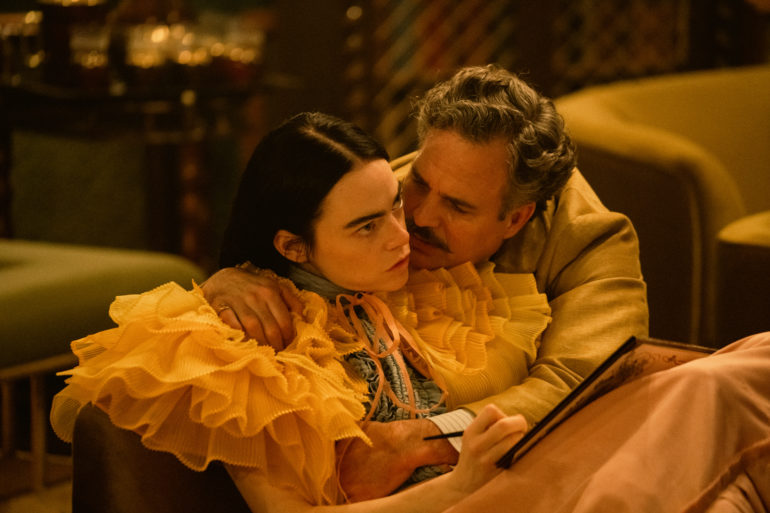Few people can do what Yorgos Lanthimos does. With one film after another, he confounds expectations of genre and manners to shocking and oft-dazzling effect. From hiding sly sci-fi ideas in the demented drama of Dogtooth, to the sapphic political intrigues of The Favourite, we simply cannot take a Lanthimos film at face value. If you tried it with Poor Things, the overwhelming sensory experience the Greek auteur has created would perplex and fascinate in equal measure, but Lanthimos has a lot of help from one woman in particular to keep you interested.
Like his characters, Lanthimos’ films tend to get straight to the point. Poor Things opens with Emma Stone throwing herself off a bridge into the Thames. If that doesn’t get your attention, then Willem Dafoe’s scarred, deformed Dr. Baxter retrieving her body and reanimating her should. Five minutes in, and Lanthimos is transcending genres again. His choice of material this time is Alisdair Gray’s 1992 novel, adapted by The Favourite co-writer Tony McNamara. Though the novel is primarily set in Scotland, the film version feels like a product of another world. Inhabited by freaks and geeks of all shapes and sizes, Poor Things is about finding the humanity in the people we can’t see (or even refuse to see) as human. Would Dr. Baxter have resuscitated poor Bella (Stone) if she wasn’t just an experiment for him? Reduced to an infantile mind and with no memory of her past life, the newly-christened Bella Baxter must learn how to make her way in this world from scratch. The black-and-white cinematography in these early scenes (from Irish cinematographer Robbie Ryan) recalls horror flicks aplenty to sell the terror of what Dr. Baxter is trying to do with his newfound ‘child’. The reanimation is pure Frankenstein, while Dr. Baxter himself recalls The Elephant Man and Expressionist horror.
How does an infant react when they have a grown woman’s body? With all the puerile behaviour one would expect. From slapping people to confusing speech patterns, Bella is a model of imperfect behaviour, and that’s even before she discovers what’s happening below her belly button. Her newly-discovered habit of self-pleasure leads to many a faux pas and lewd interlude (“She tried to touch my hairy business!”). Make no mistake: Poor Things is as sex-mad as Bella herself. But why wouldn’t she be? It is the discovery of her sexuality that causes Bella to start making some decisions for herself, and to go out into the world and sample what it has to offer. The biggest source of this impetus is Mark Ruffalo’s libertine lawyer Wedderburn, who is entranced by her combination of naïveté and horniness. Ruffalo gets his funniest role in a while here, going from smooth cad to pathetic spurned lover with ease as Bella’s journey goes on.
Bella sets off on her journey of self-discovery around Europe with the grudging blessing of Dr. Baxter and her fiancé Mr. McCandles (An admirably straight-laced Ramy Youssef). The journey is overpowering in its colours and energy, with steampunk designs and crumbling ruins interspersed with Stone and Ruffalo engaging in various bouts of what Bella calls ‘furious jumping.’ Poor Things is a science fantasy through and through, but it may be too determined to call attention to itself. The garish designs and frequent use of fisheye lenses assault the eyes, while the dialogue lapses into puerility for its own sake at times. Think Wes Anderson if he just lost his virginity anew; the efforts of the production are there for all to see, but they often overwhelm the story, rather than adding to it.
The metaphor of Bella’s voyage as the journey of women through their adult lives is a potent one, if not quite as subtle as some of Lanthimos’ previous work. Over a generous 141 minutes, Bella finds herself going from the sublime to the ridiculous in her quest for meaning, from gambling in Alexandria to prostitution in Paris. Between its dialogue and its mannerisms, Poor Things could become annoying were it not for one key ingredient. In the lead role, Emma Stone transforms herself from the sunny and charming girl next door into one of the most daring actresses working today. She entirely inhabits Bella’s warped mind with physical and emotional commitment. Unafraid of stripping off, looking foolish or even being unlikeable, Stone brings Bella to messy, awkward life. Her investment in the character is breathtaking, and will be rightly recognised by awards bodies. Stone grounds Poor Things and gives it a heart and relatability that it would have otherwise lacked. Lanthimos demands bravery from his casts, but Bella may be the most challenging role in all his films to date. She’s challenging because she’s surprisingly identifiable; we all want to find our place in the world, after all. Poor Things could have been a hollow sex romp or an overwritten metaphor. As it is, it lands somewhere between the two, but its leading lady fuses the bawdiness and the thoughtfulness, and holds them together. The online debaters of the necessity of sex scenes in film won’t know what hit them.

